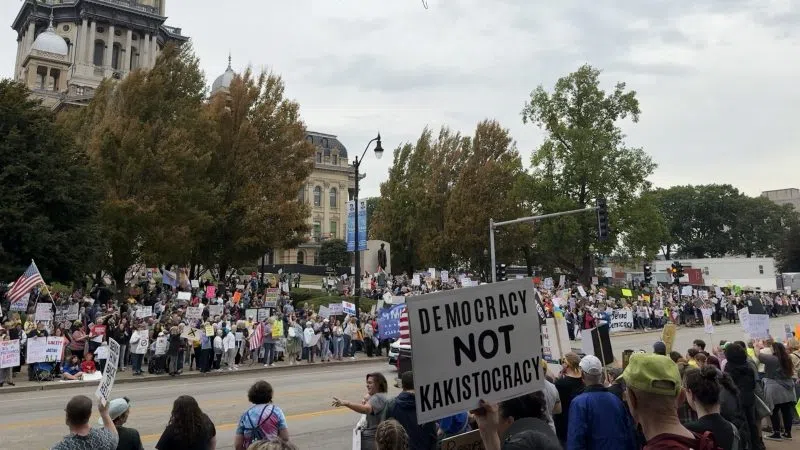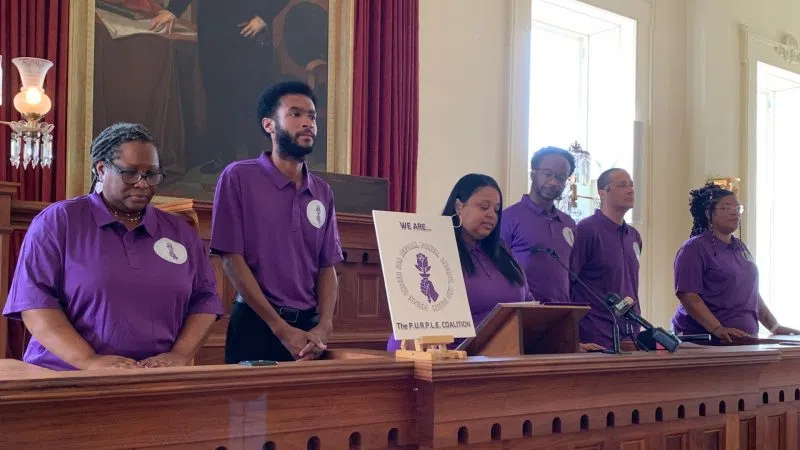By ANDREW ADAMS
Capitol News Illinois
aadams@capitolnewsillinois.com
SPRINGFIELD — Heading into the end of the legislative session, consumer advocates, renewable energy industry groups and environmental advocates were hopeful about a bill that would have overhauled Illinois’ energy industry.
It would have been the largest energy reform in years, touching almost every part of the state’s electricity sector. Some said it would have been as significant as the 2021 Climate and Equitable Jobs Act — the law that requires fossil-fuel burning power plants to shutter by 2045.
But lawmakers declined to take up the bill, kicking the can down the line on energy reform for the second time this year after initially punting on the issue during the January lame duck session.
Read more: Lawmakers give small boost to renewable developments, delay broader reform
“It was a confluence of factors,” Christine Nannicelli, a Sierra Club organizer and longtime environmental advocate, told Capitol News Illinois. “To a certain extent, it was a product of running out of time.”
Lawmakers had a fairly large to-do list going into the final day of the legislative session, including approving the multiple bills that make up the state’s annual budget and a large reform package dealing with public transit in northern Illinois.
That transit legislation was also a high priority for environmental groups and labor organizations — both of which were central to the fight over energy reform.
Read more: Senate’s transit funding, delivery tax proposal stalls in House
In addition to environmentalists and labor, the bill was being negotiated by representatives of the governor’s office, major utilities and representatives of the renewable energy industry.
The push for an energy reform package grew out of a growing sense of concern that the state won’t be able to meet its ambitious climate goals. The rise of power-hungry data centers has placed significant demands on the electric grid at a time when the supply of electricity is stagnant or falling.
This situation has already led to higher prices. This month, prices on residential electric bills are increasing by an average of $10.60 per month for Commonwealth Edison customers in northern Illinois and by $45 per month for Ameren Illinois customers downstate.
Read more: Lawmakers seek ways to prevent data centers from straining Illinois’ power grids | Summer electric price spike fuels policy tensions in Springfield
While lawmakers couldn’t do anything to stop those increases, the prospect of prices staying high for longer has frustrated some advocates.
“We’re gonna lick our wounds,” Anna Markowski, who works on Midwestern issues for the Natural Resource Defense Council, said in an interview.
Signals that negotiations were heating up — and possibly breaking down — came two weeks before session ended on Saturday. A proposal from environmental groups to impose new costs on data centers drew fierce public criticism.
A letter urging Gov. JB Pritzker to oppose the proposal was released by a coalition of interest groups including the AFL-CIO, Climate Jobs Illinois, Illinois Manufacturers’ Association and Constellation Energy — the last of which operates all the state’s commercial nuclear power plants. A similar letter was signed by several economic development officials from around the state.
The provision, which would have required data centers and other large electric customers to fund new energy developments to offset their demand, was dropped from the bill shortly after.
While the data center provision drew the most public controversy, other parts of the bill were being negotiated until the last minute, reflecting a lack of consensus among activists, industry groups and other stakeholders.
The bill was also set to outline a battery storage incentive program, similar to how the state incentives solar energy. Advocates for the would-be program said it would spur historic levels of private sector investment in renewable energy.
The bill would have required 6 gigawatts of energy storage developments over the next decade, with half by 2030. This is in line with recommendations from an Illinois Commerce Commission report that lawmakers commissioned earlier this year in anticipation of this bill and in line with an analysis done by the Union of Concerned Scientists last year.
Read more: Worried about grid reliability, state officials seek to boost renewables, energy storage
Nannicelli said this provision was opposed by some labor organizations, contributing to the demise of the bill. As of Saturday afternoon, the bill drew overall opposition from at least one union, although several others indicated via “witness slips” that they were neutral on the bill.
“These are critical issues to get right for consumers and working families that shouldn’t be forced by a deadline,” Joe Duffy, executive director of the labor-affiliated group Climate Jobs Illinois, said in a statement. “We look forward to continuing conversations over the summer to take the time needed to get it right.”
That program also drew serious concerns from some industrial groups. The Illinois Manufacturers Association worried the rate increases to pay for the battery program would have cost businesses too much.
An estimate from the American Petroleum Institute, who represents businesses that operate refineries, pegged the cost of the program over the next 11 years at about $9 billion.
“My main argument at the macro level is that it’s very expensive for very little return,” Jim Watson, who handles API’s efforts in Illinois, said Saturday. “And it does little to address capacity issues.”
An analysis from the Solar Energy Industry Association, a solar trade group, found the savings from a battery storage program would outweigh the costs, saving consumers money in the long run.
Read more: State official: renewable investments ‘best thing’ to lower energy costs
A solar industry insider said lawmakers will “stay at the table” to reduce energy prices as federal support is “incredibly unlikely” under the current political climate.
“Unfortunately, Illinois’ spring legislative session ended without a lasting solution to the continued and unprecedented energy cost increases that are taking money out of families’ wallets,” Lesley McCain, head of the Illinois Solar Energy & Storage Association, said in a statement. “While this was a disappointing conclusion to the session, we have every reason to believe leaders in Springfield remain committed to moving Illinois’ clean energy transition forward.”
Several other provisions of the bill drew significant attention as the pitch made its rounds in Springfield. One such aspect of the bill would have outlined an “integrated resource plan” process for the Illinois Commerce Commission.
This would have been a major shift at the ICC, giving the regulatory agency more authority over the state’s electric grid and more ability to alter the emissions-reduction goals of the state. Since the passage of CEJA in 2021, the ICC has become a primary enforcer of the state’s climate goals.
But, like other elements of the plan, it faced pushback from business groups. The Manufacturers’ Association was concerned that lawmakers would be ceding too much authority to state regulators.
While the bill contained several other provisions, another major issue on the table was lifting the state’s longstanding moratorium on new nuclear power developments.
Two years ago, the state loosened restrictions, allowing for the development of small nuclear reactors — the type that has only become possible in recent years thanks to technological breakthroughs. Those remain in the early stages of commercial development.
Ending the nuclear moratorium for large nuclear reactors was one of the least controversial issues in the bill. While some environmentalists were opposed, others did not feel strongly about it. Business groups were broadly in favor of it.
Like other aspects of the bill, it may return in a future legislative session. But for a broader reform package, it’s back to the drawing board.
Environmental and consumer advocates, union organizers, utilities and energy companies all indicated that negotiations would continue into the summer and that there is, broadly, a desire from lawmakers to move forward in some way to lower energy prices raised by data centers’ demand.
But what that could be, and when it might happen, is now up in the air.
“If you kick the can down the road, even a month, things could have pretty significant impact,” Nannicelli said. “We need to make a clear decision: who’s going to pay for these costs of unprecedented load growth that’s coming in large part from data centers?”
Capitol News Illinois is a nonprofit, nonpartisan news service that distributes state government coverage to hundreds of news outlets statewide. It is funded primarily by the Illinois Press Foundation and the Robert R. McCormick Foundation.







